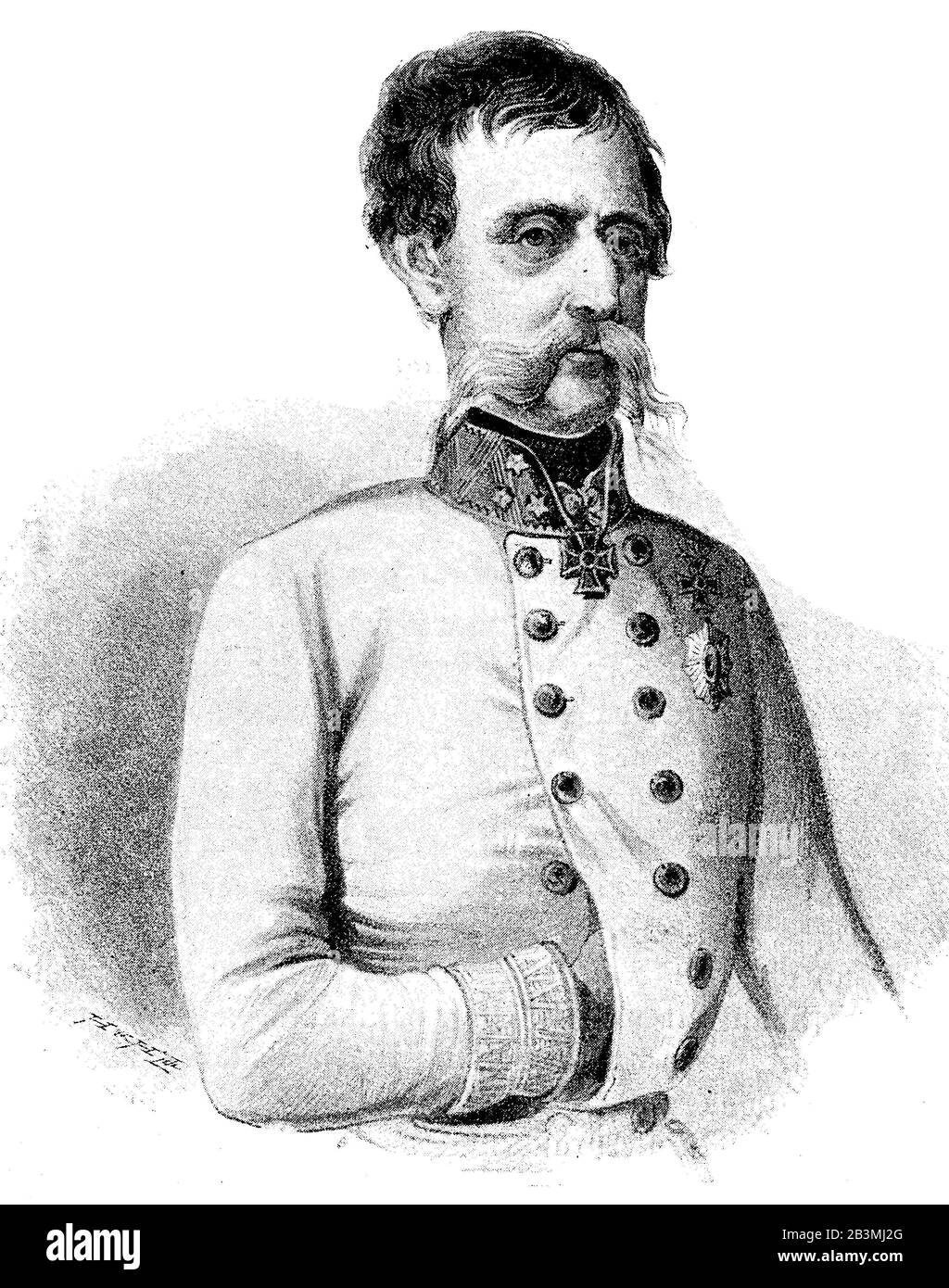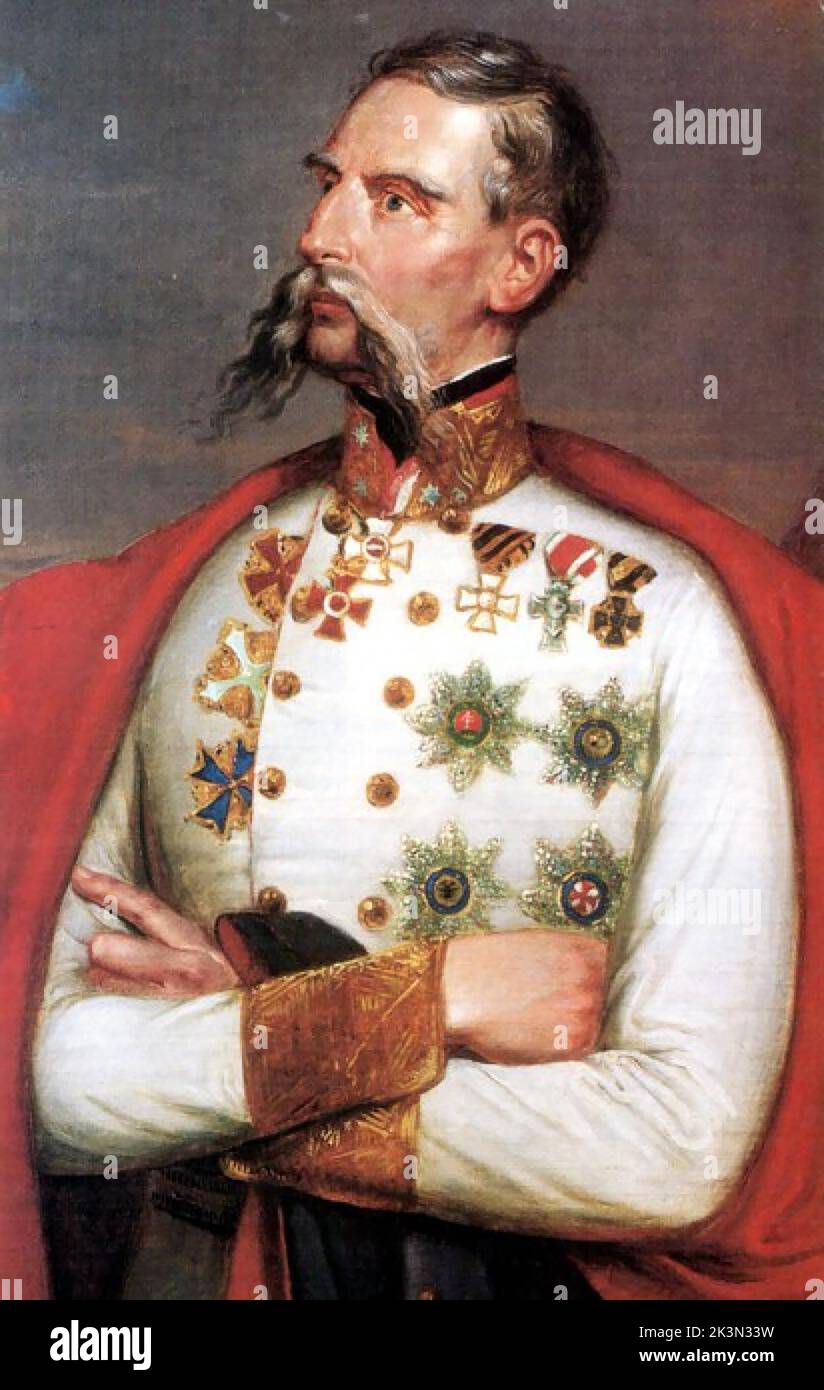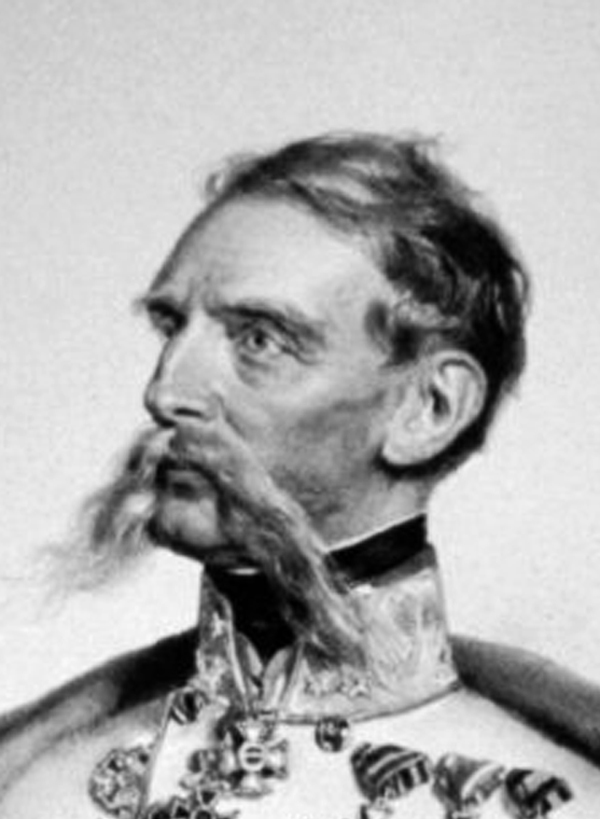
Julius jakob freiherr von haynau Banque de photographies et d’images à haute résolution Alamy
GEN Julius Jacob von Haynau. 14 Mar 1853 (aged 66) Vienna, Wien Stadt, Vienna (Wien), Austria. Sankt Leonhard Friedhof. Styria (Steiermark) Suggest Edits. He was an Austrian general who was prominent in suppressing insurrectionary movements in Italy and Hungary in 1848 and later. While a hugely effective military leader, he also gained renown.

Julius Jacob von Haynau Biography 19thcentury Austrian general Pantheon
Baron von Julius Jakob Haynau, a natural son of William IX, the Elector of Hesse, was born in 1786. He entered the Austrian army and saw service in the Napoleonic Wars. He held a high command in the Italian campaigns of 1848-49 and became prominent for various atrocities, particularly the flogging of women at the taking of Brescia.

Von haynau julius jakob freiherr hires stock photography and images Alamy
Julius Jacob von Haynau (Kassel, 14 ottobre 1786 - Vienna, 14 marzo 1853) è stato un generale austriaco Biografia I primi anni e la carriera militare Lo stemma dei baroni di Haynau, ramo illegittimo dei langravi d'Assia-Kassel a cui Julius apparteneva. Figlio naturale del langravio Guglielmo I.

Julius Jacob von Haynau Alchetron, the free social encyclopedia
Báró Julius Jacob von Haynau ( Kassel, Németország, 1786. október 14. - Bécs, 1853. március 14.) császári-királyi táborszernagy (k.k. Feldzeugmeister), Szatmár vármegyében gazdálkodó földbirtokos.

Julius Jacob von Haynau Stock Photo Alamy
Julius Jacob von Haynau (October 14, 1786 - March 14, 1853) was an Austrian general who was prominent in suppressing insurrectionary movements in Italy and Hungary in 1848 and later. His soldiers called him the "Habsburg Tiger"; those opponents who suffered from his brutality called him the "Hyena of Brescia" and the "Hangman of Arad." Contents

Julius Jacob von Haynau T.D.L.A. Szégyenfüzet
Julius Jakob Freiherr von Haynau was an Austrian general who suppressed insurrectionary movements in Italy and Hungary in 1848 and later. While a hugely effective military leader, he also gained renown as an aggressive and ruthless commander. His soldiers called him the "Habsburg Tiger"; those opponents who suffered from his brutality called him the "Hyena of Brescia" and the "Hangman of Arad".

Julius Jacob von Haynau editorial stock image. Image of austrian 27011379
View Complete Profile Matching family tree profiles for General Julius von Haynau Julius Heinrich Jakob Freiherr Von Haynau in MyHeritage family trees (Johansen Web Site) Julius Von Haynau in MyHeritage family trees (fransson Web Site) Julius Jacob Von Haynau in MyHeritage family trees (Historical Monarchy Family Tree)
Julius Jacob von Haynau — Google Arts & Culture
Media in category "Julius Jacob von Haynau" The following 24 files are in this category, out of 24 total. Austrian Medal honouring von Haynau in 1849, obverse.jpg 2,073 × 2,059; 1.36 MB Austrian Medal honouring von Haynau in 1849, reverse.jpg 2,087 × 2,070; 1.42 MB Baron Haynau.jpg 777 × 1,029; 974 KB

General Julius Jacob von Haynau facing onto Venice, by Franz Adam (18151886), Stock Photo
The Hungarian Government agreed on a Hungarian attack against the Austrian troops led by Julius Jacob von Haynau, which was stationing to East and South-East from the fortress of Komárom. On 11 July the Hungarian army started to attack the Austrians.

Julius Jacob Von Haynau Là Một Vị Tướng Người Áo Nổi Bật Trong Việc Đàn Áp Các Phong Trào Nổi
HAYNAU, JULIUS JACOB (1786-1853), Austrian general, was the natural son of the landgrave—afterwards elector—of Hesse-Cassel, William IX. He entered the Austrian army as an infantry officer in 1801, and saw much service in the Napoleonic wars. He was wounded at Wagram, and distinguished during the operations in Italy in 1813 and 1814.
Julius Jacob von Haynau — Google Arts & Culture
The Battle of Temesvár (now Timișoara, Romania) was a key battle in the Hungarian Revolution of 1848, fought on 9 August 1849 between the Austrian Empire, led by Field Marshal Julius Jacob von Haynau, and the Hungarian Revolutionary Army (supplemented by Polish volunteers), led by Lieutenant General Józef Bem.Hungarian forces under Bem, together with siege corps led by Major General Károly.

HAYNAU, Julius Jakob Freiherr von Haynau (17861853), österreichischer General (1850
Julius Jakob Freiherr von Haynau (14 October 1786 - 14 March 1853) was an Austrian general who suppressed insurrectionary movements in Italy and Hungary in 1848 and later. While a hugely effective military leader, he also gained renown as an aggressive and ruthless commander. Read more on Wikipedia

HAYNAU, Julius Jakob Freiherr von (1786 1853). Kniestück nach dreiviertellinks des
Julius Jakob Freiherr von Haynau (14 October 1786 - 14 March 1853) was an Austrian general who suppressed insurrectionary movements in Italy and Hungary in 1848 and later. While a hugely effective military leader, he also gained renown as an aggressive and ruthless commander.
Julius Jacob von Haynau — Google Arts & Culture
Julius Jacob von Haynau (1786 - 1853) was an Austrian general and a member of the Austrian Rite of the Templar Order. At some point in his life, von Haynau was inducted into the Templar Order. As an Austrian general, Baron von Haynau suppressed insurrectionary movements, especially in Hungary. During the Hungarian Revolution of 1848, the baron personally ordered the female rebels to face.

Wikiwand Julius Jacob von Haynau Ferrari, Immagini
Julius, baron von Haynau, (born Oct. 14, 1786, Kassel, Hesse-Kassel [Germany]—died March 14, 1853, Vienna, Austrian Empire), Austrian general whose military successes were overshadowed by his notorious brutality.

A világ megdöbbent a magyarországi vérengzésen 24.hu
Julius Jacob von Haynau was one of the eight illegitimate children of count Wilhelm ofHessen ( 1743-1821) and a daughter of a Jewish pharmacist, Rosa Wilhelmina Dorothea Ritter (1759-1833). All the· seven children reaching maturity were given the high-ranking title "von Haynau" in 1800 by Wilhelm, who was brave enough to acknowledge his second.